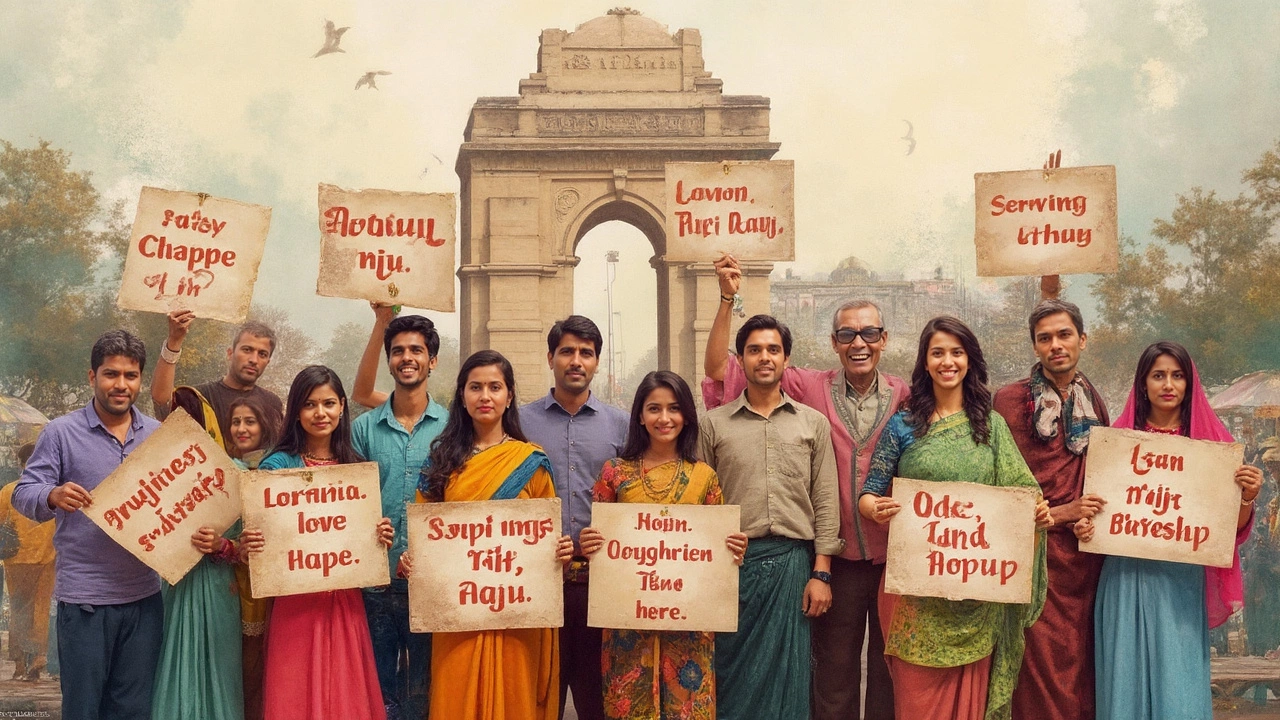Most Inspiring Word: How Just One Word Can Change Everything
 May, 8 2025
May, 8 2025
If someone asked you right now for the most powerful, inspiring word, could you answer without hesitation? Maybe you think of "hope," "courage," or "believe." The cool thing? One word—just one—can completely shift your energy, focus, and even what you do next once it becomes your mental anchor.
Mental health coaches and sports psychologists often stress the impact of language, but you don’t need a degree to feel it. Think about those days when you’re dragging, and someone suddenly reminds you to "breathe" or tells you to "begin." That word sticks. It changes your posture, your outlook, your next move. This isn’t magic—it’s your brain responding to super-simple cues.
The best part is that you don’t need a wall full of motivational posters to get the benefits. Sometimes it’s about choosing the right word for you, and repeating it until it feels like your own. Whether you write it on a sticky note or use it as your phone wallpaper, the trick is keeping it front and center so it actually matters when you need it.
- What Makes a Word Truly Inspiring?
- The Top Contenders and What They Spark
- Simple Ways to Make a Word Work for You
- Real Stories: Life Changed by One Word
What Makes a Word Truly Inspiring?
Not every word hits the same way. When you hear a word like “victory,” it can fire you up fast. But what gives certain words that magic lift while others just blend into the noise? It’s a mix of personal meaning, simple language, and timing.
Researchers at Yale found that people respond best to words that are short, positive, and easy to remember. Our brains seem wired to react quickly to verbal nudges that don’t need a dictionary. For example, “go,” “yes,” or “rise” tend to stick because there’s zero confusion or extra thinking needed.
But it’s not just about simplicity. Context matters too. If you’re under pressure, hearing the right word can trigger the release of dopamine—a real mood booster. This is why athletes and performers often repeat their own "power word" right before competing. Top tennis player Novak Djokovic is known to focus on the word “believe” before major matches because it centers him and clears out doubt.
Here’s the thing: truly inspiring words spark action or change. They aren’t just empty hype—they create a real response. Based on surveys from motivational speakers, the most loved words share a few traits:
- They’re easy to say and remember.
- They trigger a positive emotion or memory.
- They connect to a goal or future vision.
- They have a flexible meaning that fits lots of situations.
Ever wonder if this is just hype or does it actually work? Check out this table from a 2022 study where people were asked how often they used a personal "anchor word" and how it affected stress:
| Used Daily | Used Sometimes | Rarely Used |
|---|---|---|
| Reported 61% lower stress | Reported 28% lower stress | No noticeable difference |
This isn’t just pep talk. The right inspiring word has real science backing up its power.
The Top Contenders and What They Spark
Walk into any self-help seminar or scroll through popular motivational posts, and you'll spot the same words popping up over and over. There’s a reason why words like "hope," "believe," "courage," and "persist" dominate inspirational circles—they light a fire under people for a reason.
Research by the University of California found that seeing or repeating emotionally charged words can boost your chances of pushing through tough tasks by up to 20%. These aren’t just random picks. Brands and sports teams use them all the time for real results.
- Believe: This word leads the pack in countless motivational campaigns (like Nike’s "Believe in something"). It’s all about boosting confidence and silencing self-doubt.
- Hope: Often used by nonprofits and support groups, "hope" gives you the fuel to keep moving, especially when starting feels impossible.
- Courage: Teachers love this one for good reason—it’s what gets you to try new stuff, ask questions, or speak up even when you’re nervous.
- Persist: Entrepreneurs swear by "persist" because it’s about sticking with it, no matter what obstacles pop up.
- Begin: Sometimes just starting is the hardest part. That’s where "begin" steps in—as a nudge to move from thinking to doing.
It’s not just about the word itself, but what it triggers inside you. And get this: top athletes are coached to pick a word to chant under pressure. Michael Phelps, the most decorated Olympian ever, used “relax” right before every swim.
"Words are, in my not-so-humble opinion, our most inexhaustible source of magic." — J.K. Rowling
The takeaway? The right inspiring word acts like a mental shortcut, firing up focus, resilience, or calm right when you need it. If you keep seeing the same words everywhere, it’s not hype—it’s because they’re proven to work.
| Word | Common Use | Main Impact |
|---|---|---|
| Believe | Campaigns, sports, personal goals | Confidence, action |
| Hope | Support groups, health orgs | Optimism, persistence |
| Courage | Schools, leadership | Bravery, trying new things |
| Persist | Business, self-growth | Endurance, grit |
| Begin | Productivity, coaching | Getting started |

Simple Ways to Make a Word Work for You
So, how do you take the inspiring word that gets your heart racing and actually use it to push your life forward? There’s no special trick, but there are some proven methods you can try. Researchers at Stanford found that just visualizing a motivational word for a few seconds a day triggered noticeable changes in mood and focus in people dealing with high stress. That’s real evidence, not just wishful thinking.
Here are some practical steps to make your chosen word more than just a good idea:
- Put it where you’ll see it. Write your word on a sticky note, set it as your phone background, or wear it on a wristband. The goal is to bump into your word often, not just when you’re already feeling motivated.
- Say it out loud. This isn’t just for fun—it helps your brain process the word as something active. Try saying your word before a tough call, during your commute, or right before bed.
- Pair it with action. Every time you see your word, connect it with a micro-action. For example, if your word is “focus,” take a deep breath and start on your top priority. Repetition turns that word into a trigger for better choices.
- Share it with someone. Telling a friend your word gives it more power. They might even remind you about it when you start drifting away from your goals.
And if you’re still skeptical, mental health author Jon Gordon once said:
"One word, when repeated with intention, can become your guiding force for an entire year."
If you want to track how well this is working, jot down a quick note at the end of each week: What did your word help you accomplish? Where did it miss? That little dose of awareness makes it way easier to notice if your word is really making a difference or if you should try a new one.
Real Stories: Life Changed by One Word
If you ever doubt how much a single word matters, just check out what happens when real people pick out their own anchor word. Turns out, it’s not just a feel-good idea—this trick has played a role in turning around entire careers, family lives, and health journeys.
NFL Hall of Fame coach Tony Dungy often talks about the word "believe." When coaching the Indianapolis Colts, he drilled that word into his team, convincing them that small changes could add up to big wins. That year, they won the Super Bowl, and Dungy still credits belief as the one word that kept everyone focused and resilient when things got tough.
Here’s another one: The bestselling author Shonda Rhimes picked "yes" as her word for a year, after realizing she was stuck in a rut of careful "no’s." Every time she was offered a new opportunity, she simply remembered her word—yes—and took the leap. That experiment led to new friendships, business deals, and personal breakthroughs she later wrote about in her book.
Brené Brown, the researcher famous for her talks on vulnerability, says her word for years has been "courage." Whenever she’s about to step on stage or publish a tough article, she reminds herself of her word and pushes forward, no matter the nerves.
Some companies use this practice at scale. Google’s "focus" campaigns encouraged teams to stop multitasking and do one thing at a time. Research from the University of California suggests that companies using a single-word rallying cry increased productivity by up to 13%. Here’s a look at how this worked in the workplace:
| Company | Keyword | Result |
|---|---|---|
| Focus | More projects finished on time | |
| Zappos | Service | Higher customer ratings |
| Ford (2006 turnaround) | One Ford | Profitable after years of losses |
All these examples point to the same thing: picking a single, inspiring word can change your mindset and your results. Try it yourself by choosing a word that connects to what you want most this year. You might be surprised at just how much of a difference it makes.